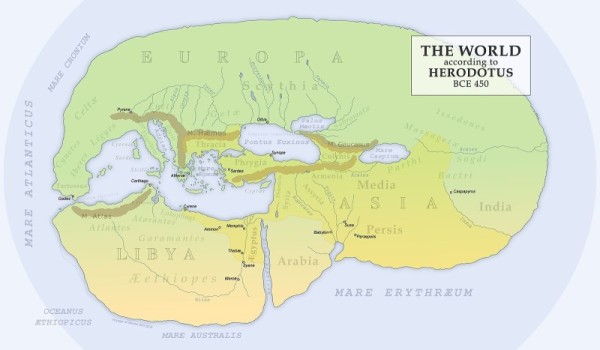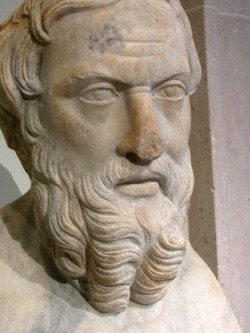Then Cambyses, when he heard the name of Smerdis, perceived at once the true meaning of this report . . . .

Translated by George C. Macaulay — our special project presenting the complete Herodotus with URLs for all of those people, places, events, and things which baffles and discourages modern readers.
Previously on Herodotus
63. When Prexaspes had thus spoken, Cambyses was pleased with the advice, and accordingly the herald was pursued forthwith and returned. Then when he had come back, Prexaspes asked him as follows:
Man, thou sayest that thou art come as a messenger from Smerdis the son of Cyrus: now therefore speak the truth and go away in peace. I ask thee whether Smerdis himself appeared before thine eyes and charged thee to say this, or some one of those who serve him.”
He said:
Smerdis the son of Cyrus I have never yet seen, since the day that king Cambyses marched to Egypt: but the Magian whom Cambyses appointed to be guardian of his household, he, I say, gave me this charge, saying that Smerdis the son of Cyrus was he who laid the command upon me to speak these things to you.”
Thus he spoke to them, adding no falsehoods to the first, and Cambyses said:
Prexaspes, thou hast done that which was commanded thee like an honest man, and hast escaped censure; but who of the Persians may this be who has risen up against me and usurped the name of Smerdis?”
He said:
I seem to myself, O king, to have understanding of this which has come to pass: the Magians have risen against thee, Patizeithes namely, whom thou didst leave as caretaker of thy household, and his brother Smerdis.”
64. Then Cambyses, when he heard the name of Smerdis, perceived at once the true meaning of this report and of the dream, for he thought in his sleep that some one had reported to him that Smerdis was sitting upon the royal throne and had touched the heaven with his head: and perceiving that he had slain his brother without need, he began to lament for Smerdis; and having lamented for him and sorrowed greatly for the whole mishap, he was leaping upon his horse, meaning as quickly as possible to march his army to Susa against the Magian; and as he leapt upon his horse, the cap of his sword-sheath fell off, and the sword being left bare struck his thigh. Having been wounded then in the same part where he had formerly struck Apis the god of the Egyptians, and believing that he had been struck with a mortal blow, Cambyses asked what was the name of that town, and they said “Agbatana.” Now even before this he had been informed by the Oracle at the city of Buto that in Agbatana he should bring his life to an end: and he supposed that he should die of old age in Agbatana in Media, where was his chief seat of power; but the oracle, it appeared, meant in Agbatana of Syria. So when by questioning now he learnt the name of the town, being struck with fear both by the calamity caused by the Magian and at the same time by the wound, he came to his right mind, and understanding the meaning of the oracle he said: “Here it is fated that Cambyses the son of Cyrus shall end his life.”

CC BY-SA 2.0 image from Wikipedia.
65. So much only he said at that time; but about twenty days afterwards he sent for the most honourable of the Persians who were with him, and said to them as follows:
Persians, it has become necessary for me to make known to you the thing which I was wont to keep concealed beyond all other things. Being in Egypt I saw a vision in my sleep, which I would I had never seen, and it seemed to me that a messenger came from home and reported to me that Smerdis was sitting upon the royal throne and had touched the heaven with his head. Fearing then lest I should be deprived of my power by my brother, I acted quickly rather than wisely; for it seems that it is not possible for man to avert that which is destined to come to pass. I therefore, fool that I was, sent away Prexaspes to Susa to kill Smerdis; and when this great evil had been done, I lived in security, never considering the danger that some other man might at some time rise up against me, now that Smerdis had been removed: and altogether missing the mark of that which was about to happen, I have both made myself the murderer of my brother, when there was no need, and I have been deprived none the less of the kingdom; for it was in fact Smerdis the Magian of whom the divine power declared to me beforehand in the vision that he should rise up against me. So then, as I say, this deed has been done by me, and ye must imagine that ye no longer have Smerdis the son of Cyrus alive: but it is in truth the Magians who are masters of your kingdom, he whom I left as guardian of my household and his brother Smerdis. The man then who ought above all others to have taken vengeance on my behalf for the dishonour which I have suffered from the Magians, has ended his life by an unholy death received from the hands of those who were his nearest of kin; and since he is no more, it becomes most needful for me, as the thing next best of those which remain, to charge you, O Persians, with that which dying I desire should be done for me. This then I lay upon you, calling upon the gods of the royal house to witness it, -— upon you and most of all upon those of the Achaemenidai who are present here,—that ye do not permit the return of the chief power to the Medes, but that if they have acquired it by craft, by craft they be deprived of it by you, or if they have conquered it by any kind of force, by force and by a strong hand ye recover it. And if ye do this, may the earth bring forth her produce and may your wives and your cattle be fruitful, while ye remain free for ever; but if ye do not recover the power nor attempt to recover it, I pray that curses the contrary of these blessings may come upon you, and moreover that each man of the Persians may have an end to his life like that which has come upon me.”
Then as soon as he had finished speaking these things, Cambyses began to bewail and make lamentation for all his fortunes.
– Herodotus, Book III
| <—Previous | Master List | Next—> |
Herodotus made his living by being interesting. In a world where most people did not read and could not afford to buy a book even if they could, they would pay to listen to Herodotus recite from his books. They would not pay to be bored. In that world, the names that populate his stories would have some general familiarity to his audience. Their obscurity to us is a barrier that this series seeks to break down.
MORE INFORMATION
MAP LIBRARY
Because of lack of detail in maps as embedded images, we are providing links instead, enabling readers to view them full screen.

Leave a Reply
You must be logged in to post a comment.